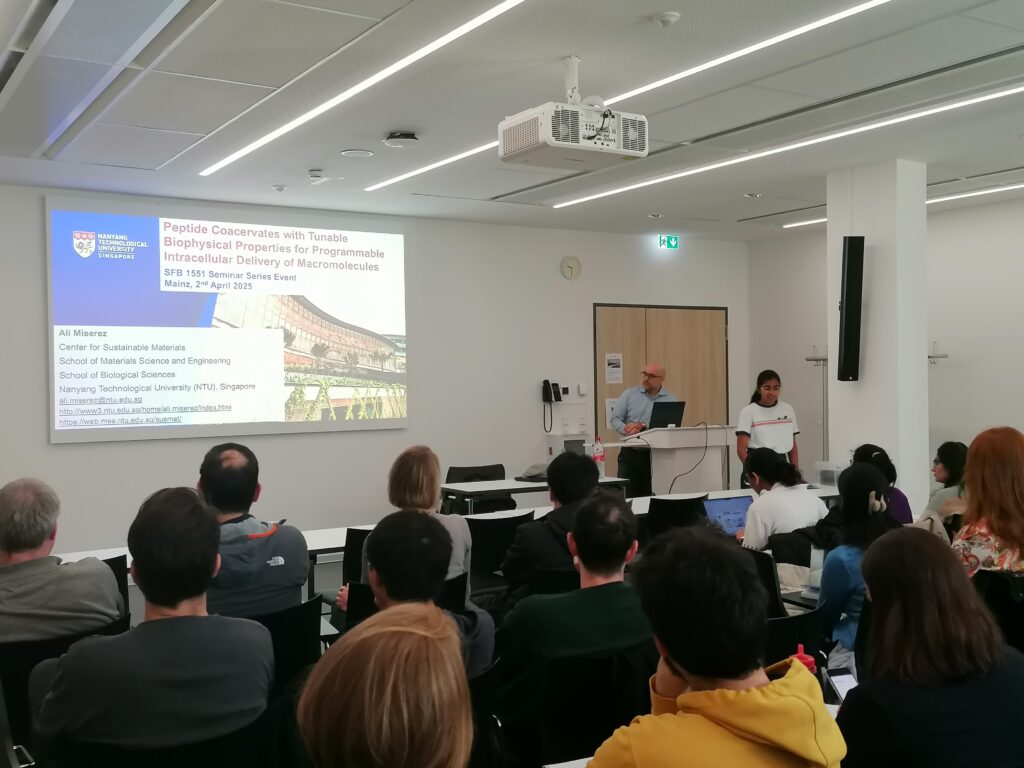Biomacromolecular therapeutics (proteins, DNA, mRNA, antibodies, gene editing tools) hold vast therapeutic potential across human disease states by addressing intracellular targets that have proven refractory to traditional approaches. However, a common hurdle to deploy these modalities lays in their inability to cross the cell membrane, which has prompted intense research into the development of safe delivery vehicles capable of packaging large biomacromolecules and deliver them intracellularly. A promising type of delivery vectors that we have recently pioneered are phase-separating peptide (PSP) coacervate microdroplets (CMs) produced by liquid-liquid phase separation (LLPS)1,2. CMs are simple to synthesize, non-cytotoxic, and can recruit a wide range of macromolecular modalities3 using aqueous-phase preparation procedures. While we have demonstrated that PSP CMs are able to cross the plasma membrane of mammalian cells and deliver their payload, the properties of CMs that regulate their cell uptake and cargo release kinetics remains poorly understood.
In this talk, I will present our recent studies4 illustrating that cell uptake and cargo release kinetics efficacy can be modulated by controlling the materials and biophysical characteristics of CMs, which can be achieved by simple mutations of PSPs. I will discuss how optimized PSP sequences yield remarkable delivery efficacy of a broad range of therapeutics, including proteins, antibodies, genes, mRNA, siRNA, and CRISPR-Cas9 gene editing tools, all of which can be transfected into cells with an efficacy that surpass currently available commercial delivery systems, including in hard-to-transfect cells such as primary and immune cells. I will finally highlight our recent studies on complex coacervates stabilized by ℼ-cation interactions as delivery vehicles to edit macrophages 5, which opens exciting possibilities for immune cell therapies.
References
1 Sun, Y. et al. Phase-separating peptides for direct cytosolic delivery and redox-activated release of macromolecular therapeutics. Nature Chemistry 14, 274-283 (2022).
2 Liu, J., Spruijt, E., Miserez, A. & Langer, R. Peptide-based liquid droplets as emerging delivery vehicles. Nature Reviews Materials (2023).
3 Sun, Y. et al. Redox-Responsive Phase-Separating Peptide as a Universal Delivery Vehicle for CRISPR/Cas9 Genome Editing Machinery. ACS Nano (2023).
4 Sun, Y. et al. Phase-separating peptide coacervates with programmable material properties for universal intracellular delivery of macromolecules. Nature Communications 15, 10094 (2024).
5 Sun, Y. et al. Peptide-Based Complex Coacervates Stabilized by Cation−π Interactions for Cell Engineering. J Am Chem Soc 147, 4284-4295 (2025).
On behalf of the IRTG, we sincerely appreciate the opportunity to engage and learn alongside Ali. Wishing you ongoing success in all your endeavors!


